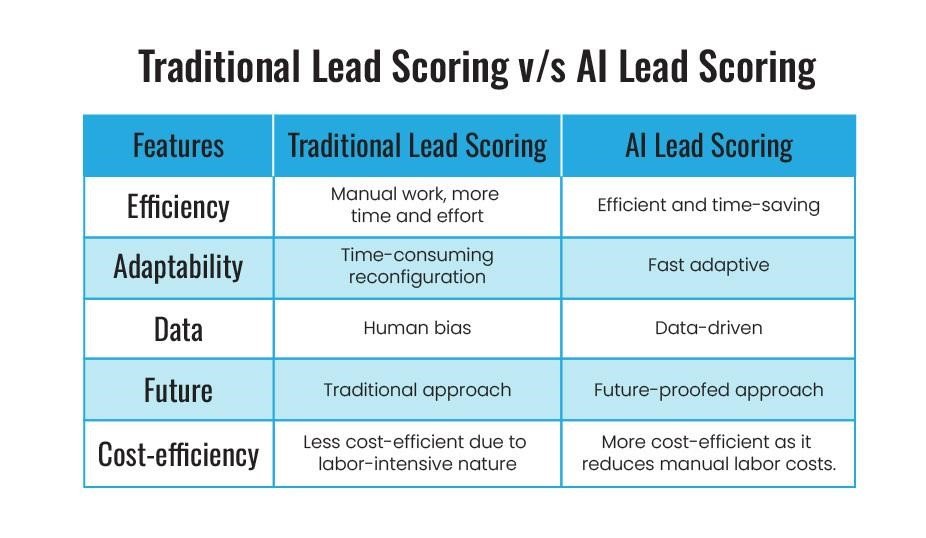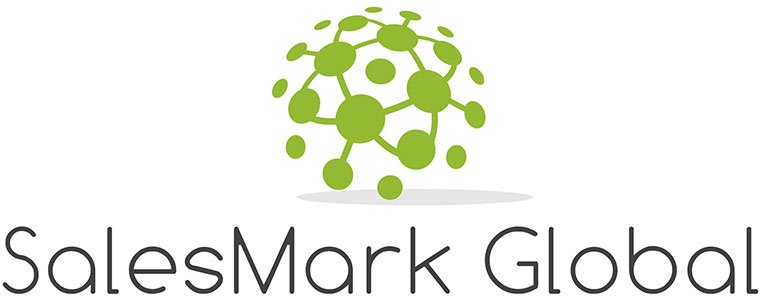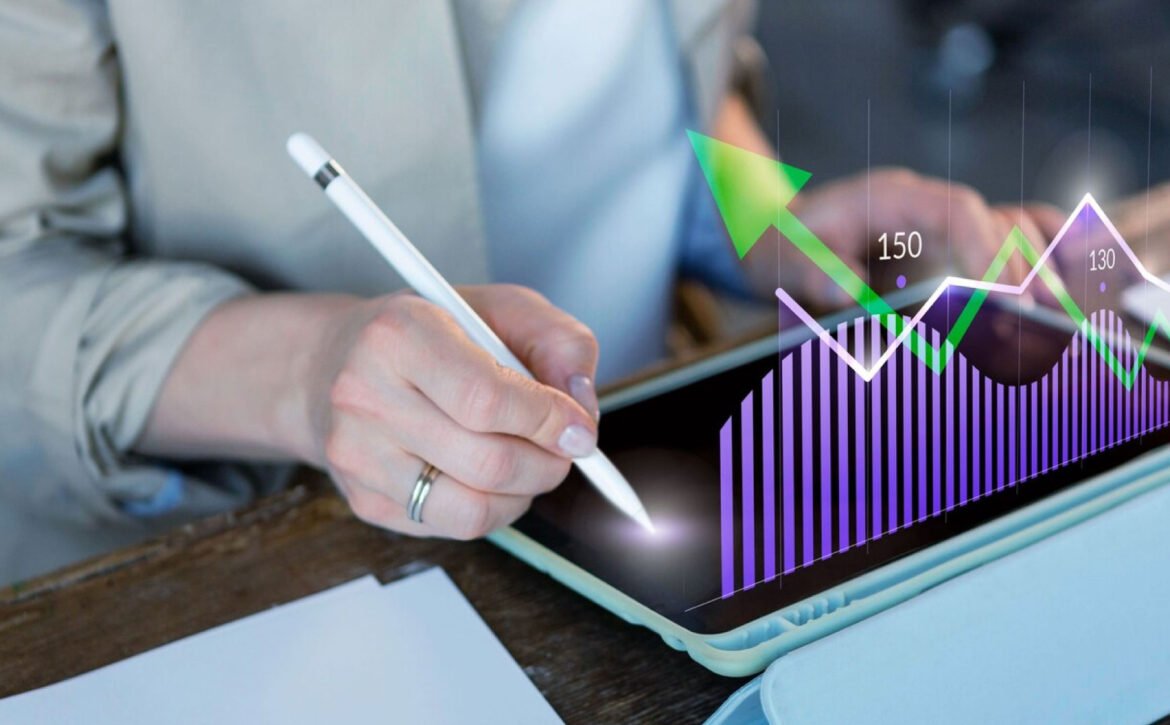Table of contents
Introduction
In the B2B world of sales and marketing, identifying promising prospects might be an ongoing challenge, as not all leads efficiently create equal business leads. To curb this challenge, the B2B marketing and sales team can harness the power of AI-powered lead scoring.
For a better understanding, let us understand what AI-powered lead-scoring software is.
AI-powered lead scoring is a new concept that utilizes artificial intelligence (AI) and machine learning algorithms (MLA) based on historical data to make predictive analyses for B2B deals about potential conversions of prospects into customers.
In today’s exclusive blog, we will discuss the transformation of AI-led lead scoring and its potential to redefine B2B lead generation.
1. The Evolution of AI Leads Scoring
AI-powered lead scoring is cutting-edge software that helps B2B marketers prioritize leads and focus on those more likely to convert into customers just by analyzing customer interaction and conversion data. This software assigns score leads based on numerous factors, such as customer behavior, historical data, and the quality of the conversation.
Consider a scenario where a potential client inquires to your sales rep about your company’s product or service and the AI lead system can adeptly identify the client’s positive tone of communication, which indicates that they are genuinely interested in making a purchase. The assigned AI software analyzes the conversation and assigns a high score (70–100) to this lead, which indicates that this client is more likely to purchase the product or service that the company provides.
By leveraging the data collection from the CRM system, marketing campaigns, and other sources, the AI software can score leads based on your target audience or buyer persona.
Whether it is a B2B business or an e-commerce website, AI lead scoring can help refine strategies in marketing and customer relationship management (CRM).
2. The Role of AI in Lead Scoring
According to a global survey conducted by a private institute, it is estimated that companies that focus their efforts on correct leads have witnessed an increase of 9%–20% in marketing conversions. Furthermore, to improve lead scoring results, organizations must understand the specifics of their products and services, as this contributes to maximizing their KPIs and reducing downtime by 86%.
The role of AI in lead scoring is simply to eliminate the tedious tasks of data collection and analysis by automating the process so that the B2B sales and marketing team has more time to invest in creating strategies to convert prospects into customers.
For a better understanding, let’s see how AI transforms the lead-selection process:
1. Data Collection
AI software gathers a vast amount of data from various sources, including website interactions, email responses, social media engagement, and CRM systems. This data is essential for assessing lead behavior and intent.
2. Data Analysis
With the assistance of machine learning algorithms (MLA), analyzing this data identifies patterns and trends, as it can detect which read behaviors are associated with successful conversions.
3. Lead Scoring Model
With the help of AI software, you can create a lead-scoring model that assigns scores to each lead based on customer demographics, behavior, and other data points, removing human bias as they look into intricate patterns while analyzing the data. The traditional lead scoring model was usually human bias, as sales reps were more inclined toward leads that they generated, which tends to be inconsistent in purchasing your product or services in the long run.
4. Predictive Analytics
The predictive analysis takes the help of machine learning, which gives a better insight into your sales and marketing teams. Through predictive analytics, which is generally based on historical data and customer behavior, you gain in-depth knowledge about your clients and how to target them so that they turn into qualified leads, which ultimately saves you time and increases your revenue.
3. Traditional vs. AI Lead Scoring
Since traditional lead scoring depends on the marketer’s opinions, it may be laborious and only sometimes correct. Furthermore, this type of lead scoring depends heavily on analysis, intuition, and chance to determine which leads have the highest chance of becoming customers.
Contrarily, AI lead scoring does a lot of the legwork and gathers information from several sources. It determines the characteristics of your ideal client and what signals a potential consumer is likely to buy from you.
For a better understanding, distinctions between AI lead scoring and conventional lead scoring are shown in this more thorough table:

4. How AI-powered Lead Scoring Sets Marketers Up for Success
According to a survey by Salesforce, AI revealed that 98% of them think it improves lead generation because an AI-enabled CRM platform has a wider reach for collecting data compared to standard CRM. The CRM platform offers data to train AI models, making lead generation more accessible when markets do not have enough internal data.
For a better understanding, let’s elaborate on how AI lead scoring helps improve sales capabilities:
1. Identifying and Prioritizing Sales Leads
B2B businesses need to work closely on quality leads for better sales conversion; however, they also need to find quality leads. AI-based lead scoring can help markets and sales teams identify quality leads that are more likely to be converted. The AI lead scoring software can help you filter quality leads out of the bulk lead data, compare non-worthy and worthy deals, and make instant decisions about whether the lead is considerable or not.
2. Identify Upselling and Cross-selling Opportunities
AI-generated lead scoring software helps in acquiring new customer bases and even enhances sales capabilities through cross-selling and upselling opportunities. With the help of CRM platforms with AI-based lead scoring capabilities, you can ensure that the engagement with your existing customers reboots again, which gives the sales team a probability that customers are willing to further connect with you, which improves your sales capabilities in the long run.
3. Better Segment and Target Your Leads
Based on AI lead scores, you can segment your leads into various engagement segments, ensuring seamless targeting and follow-up. In this way, the sales team can be aware of the lead status in every particular bracket. AI lead scoring software automatically generates a score for each of the leads to help understand different sales strategies. Furthermore, they can plan and implement effective and customized strategies to ensure better and faster conversion.
4. Alignment of Marketing and Sales Team
To ensure that the right lead is in the sales pipeline, both the marketing and sales teams should work together and use AI-powered lead-scoring software to analyze the lead’s data to attract them to the right deals. As the whole process of lead scoring is automated, the sales teams get time to focus on the right leads instead of wasting time on leads who are less likely to be converted into customers.
All the above strategies add a new dimension and intelligence to the marketing functions. The implementation of these AI-powered lead-scoring strategies leads to high-scoring leads, which offers valuable insights into the behaviors and attributes that contribute to a successful conversion.
Wrapping Up
We are in an era where demand generation, B2B marketing, and sales teams have to use AI in lead management and conversion processes to streamline these daily operations and also upgrade personalization and efficiency. As these B2B businesses embrace AI, the potential for better customer engagement and increases in sales conversions grows massively.
Marketing industrialists believe that the future of sales and marketing relies on the intelligent application of AI-powered strategies and staying ahead of the digital landscape.
Visit Our SalesMarkBlog Section to Uncover the Sales Strategies That Ignite Your Sales Journey!





